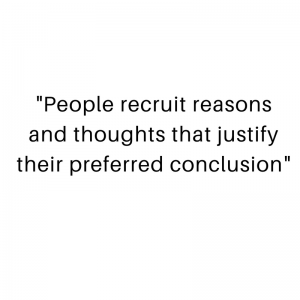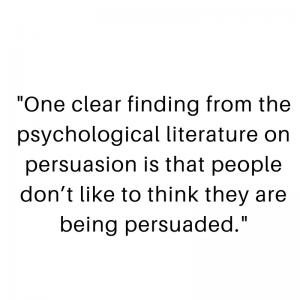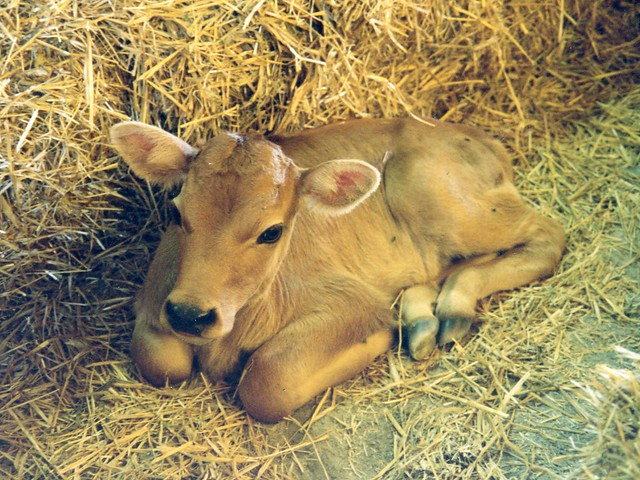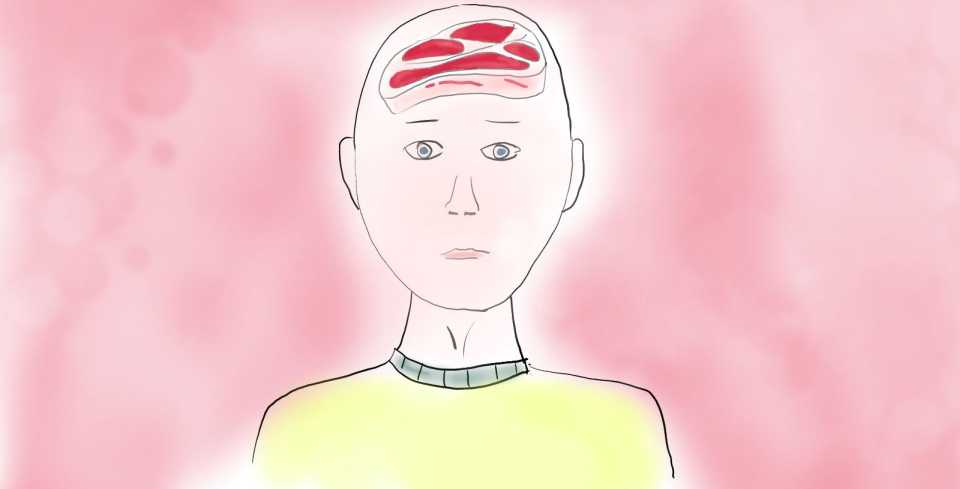Dr. Jared Piazza is a lecturer at Lancaster University in the United Kingdom. His research focuses on moral decision making, including how people think about the moral value of animals. Jared and his colleagues published the papers Rationalizing meat consumption: The 4Ns, in the journal Appetite, and When meat gets personal, animals’ minds matter less in Social Psychological and Personality Science. I interviewed Jared about obstacles to animal advocacy.
Vegan Strategist: Jared, why are there so few vegans in the world? We’re still at a mere one percent.
Jared Piazza: There are different possible answers to that question. Is it because people don’t care about animals? I don’t believe that. Americans, for instance, spent over sixty billion dollars on their companion animals in 2015. I don’t believe that they care only about dogs and cats, and not also about farm animals. Is it because people don’t know what’s happening to farmed animals, and that all we need to do is educate them about the facts? I don’t think that’s the answer either. The movement has been raising awareness about the issues for decades.
VS: So the real answer is…?
JP: The best answer I can give is that people really love meat, and they want to keep eating it. This makes them less receptive to moral arguments about farm animals. If you can address the motivation to consume meat, then people may be more receptive to animal advocacy messages and behavior change. Appetite is something that develops very early in life, and that remains quite fixed after that. Many people are neophobic (afraid of new things) when it comes to food. So it’s not easy to change appetite. The upside of this seems to be that once people do make the switch, many of them can lose the previous appetite rather quickly and permanently. This is particularly true of people who adopt ethical reasons for abstaining from meat. If you’ve been vegan for a long time and have trouble understanding the alluring power of meat, I can recommend the book Meathooked, by Marta Zaraska.
VS: You did research into two particular obstacles to animal advocacy: moral reactance and motivated reasoning. Please tell us more.
JP: Moral reactance boils down to people not wanting to be criticized or told that what they are doing is unethical. Simply raising the issue of vegetarianism – or even just refraining from meat while dining at a table of meat eaters – can elicit this kind of reactance, as people may feel there’s an implicit moral reproach in what you’re saying or (not) doing.
 Motivated reasoning is about post hoc justifications. Rather than being open to the full range of evidence, most people want the conclusion of their thinking to be that they don’t need to make a change. So they recruit reasons and thoughts that justify their preferred conclusion, reasons and thoughts that don’t require a change. When you are in a “motivated state” you are motivated in a certain direction. You are personally involved, and you will steer your reasoning so that it can justify your preferences – preferences which are shaped by your habits and appetites. By contrast, if you first create a context in which there is no external pressure to change, people may be more open to critically consider the full range of perspectives (e.g., consider that eating meat is unnecessary.).
Motivated reasoning is about post hoc justifications. Rather than being open to the full range of evidence, most people want the conclusion of their thinking to be that they don’t need to make a change. So they recruit reasons and thoughts that justify their preferred conclusion, reasons and thoughts that don’t require a change. When you are in a “motivated state” you are motivated in a certain direction. You are personally involved, and you will steer your reasoning so that it can justify your preferences – preferences which are shaped by your habits and appetites. By contrast, if you first create a context in which there is no external pressure to change, people may be more open to critically consider the full range of perspectives (e.g., consider that eating meat is unnecessary.).
VS: That’s not really great news for those of us who believe in the power of rational thinking…
JP: Motivated reasoning is certainly not rational or objective reasoning. And it has some consequences that can be problematic. People will modify their views of animals so that these beliefs are consistent with their appetite for meat. This is called belief alignment. Research has shown that if you remind people that they eat animals, people will think less of animals (in terms of their mental capacities) than when they are not reminded of that fact. People will also reduce their moral concern for animals when they think of animals as food.
VS: And then there is willful ignorance, which you tested with an interesting thought experiment.
JP: Yes, willful ignorance is about the fact that, when people are in a motivated state, they may avoid or discount “annoying” information that otherwise would be relevant. In one study, Steve Loughnan and I gave people a scenario where, at some point in the future scientists discover a new animal species (the ‘trablans’) on another planet. When we presented the trablans as intelligent, people were more concerned about the animal than when we presented it as not so smart. We saw that there was a clear correlation between the perceived intelligence of the trablans, and people’s moral concerns for it. But then we did a second study in which we also put pigs and tapirs in play, telling people that these were intelligent animals too. What we saw was that in the case of pigs, which – unlike the tapir and the trablans – people eat, the intelligence of pigs had much less effect on people’s moral concerns for them. In other words, the fact of the pigs’ intelligence was strategically ignored.
VS: What can we do about all these obstacles, as advocates for animals?
JP: One thing that we can try is to avoid motivated reasoning. This is about getting to people before they need to defend their choices, that is, before they are in a motivated, defensive state to produce post hoc rationalizations. This might be achieved by getting people to think that they are already making steps toward meat reduction – by pointing out all of the tasty non-meat foods they already eat and enjoy. Indeed, this is how I moved from being an omnivore to a health-motivated vegetarian to a vegan. I first started reducing my meat consumption because my mom scared me about the carcinogenic properties of meat, so I started reducing my meat intake. Over time not eating meat became part of my identity, which made me more receptive to information about factory farming and animal liberation. Another strategy might be to create ‘safe’ environments where people can question their own reasons for eating meat, rather than having members of the moral vanguard tell them why eating meat is wrong. This may be easier said than done, but psychology may offer some helpful tips.
One clear finding from the psychological literature on persuasion is that people don’t like to think they are being persuaded [read more about persuasion resistance], so don’t try to openly persuade them. Don’t say “I’m in this group and you’re not but you should be.” If as an omnivore, I’m afraid that you’re going to criticize me and I’m afraid you don’t want to compromise, then why would I engage with you if I know there’s only one direction this is going to go in? Maybe we should experiment more with giving people the opportunity to persuade themselves. In my lab we have found that if you have omnivores write a counter-attitudinal argument – for example, have them try to  convince a friend why it is not necessary to eat meat – rather than a pro-attitudinal argument (e.g., why it’s necessary), people are more receptive to compassionate messages about farm animals and are more willing to consider vegetarian meals. The idea here is that people can be convinced by their own arguments, more so than compelled by outside influences, even when these arguments go against how they originally think. So as animal advocates we might consider more ways to get people involved in the process of animal advocacy, thinking critically about animals and meat, rather than guilting people about eating meat.
convince a friend why it is not necessary to eat meat – rather than a pro-attitudinal argument (e.g., why it’s necessary), people are more receptive to compassionate messages about farm animals and are more willing to consider vegetarian meals. The idea here is that people can be convinced by their own arguments, more so than compelled by outside influences, even when these arguments go against how they originally think. So as animal advocates we might consider more ways to get people involved in the process of animal advocacy, thinking critically about animals and meat, rather than guilting people about eating meat.
VS: If rational arguments can only take us so far, what about emotional messaging?
JP: I think positive emotions can be particularly useful. One thing that comes to mind is the motivational power of seeing a baby animal. Baby animals are cute. All mammals share a “baby schema”: the physical properties of young animals (big eyes, round face, small nose) that can evoke nurturing, caring emotions and behavior.

Pictures of baby animals may evoke a certain tenderness in people. Image credit Kim Bartlett – Animal People, Inc.
One study showed pictures of kittens and puppies to participants (or adult cats and dogs) and then had them play the game of “Operation” (a game that requires careful, fine-motor movements, as you try to remove body parts with a stable hand so as not to get ‘buzzed’). Participants shown baby animals performed better at the game, suggesting they were being more “careful.” Also, when their grip was measured with a grip strength instrument, it was apparently less hard. This made me wonder if being exposed to baby farm animals invokes more tenderness, a feeling that may be at odds with an appetite for meat. Certainly animal advocacy groups implicitly think this is the case: many ads and leaflets I’ve seen are replete with photos of baby farm animals. We conducted a few studies to test this idea and found mixed evidence for it (we’re currently writing up the results). Exposure to images of cute farm animals does seem to evoke tenderness and reduce appetite for meat, but mostly among women, and when directly linking the animal to the meat. The effect was quite small but consistent, so tenderness seems to be a useful emotion for animal advocates to target, at least among women.
VS: What about invoking negative emotions?
JP: I think trying to evoke physical disgust about meat (for instance saying that it could carry e. coli or is rotten) might be effective. I wouldn’t recommend evoking disgust toward the killing of animals however. Disgust at cruelty is not a transformative emotion: the reaction of disgust is to repel or get away from the disgusting object (be it blood, guts, or whatever). I think anger is a more transformative emotion under these circumstances because it involves appraisals of injustice, and an impulse to right a wrong. But you have to be careful with anger too, because there’s a fine line between anger and guilt. You need to put the responsibility squarely on the producers, not with the consumers. If people feel responsible for the injustice, the impulse will largely be to pass the blame, rather than seek justice.
VS: Can guilt ever work? Many vegans say they were convinced by other vegans giving them the truth straight up. What do you think?
JP: Perhaps sometimes. But I think guilting generally fails because the person being guilted disagrees with the charges that they are doing anything wrong, and there are too many justifications easily on hand to dismiss the charges as valid.
VS: You also did research on Melanie Joy’s three N’s of justification: eating meat is necessary, natural, and normal.

People tend to give one of the “four Ns” to justify why they eat meat. Image credit Markus Binzegger, CC BY-SA 3.0.
JP: Yes, my colleagues Steve Loughnan, Matt Ruby, and I were interested to find out if Joy’s three Ns – that eating meat is necessary, natural, and normal -were the main justifications people gave when defending their right to eat animals. All three of us had read Melanie’s wonderful book, and wanted to put her theory to the test. So we recruited omnivores, a group of adults in the United States recruited online and a separate group of undergraduate students recruited at the University of Pennsylvania. We simply asked them “Why is it OK to eat meat?” and we categorized their responses. To our delight, we found evidence that people actually offered the three Ns that Melanie had written about. They also offered a fourth N – eating meat is nice (i.e., pleasurable, tasty, etc.). This is an odd argument to defend one’s right to do something harmful, but people offered it quite frequently nonetheless. Thus, we arrived at the “4Ns” of meat eating justification. Necessary was the most widespread N, but Natural and Nice had the highest level of endorsement, suggesting to us that they may be the least malleable of the four.
VS: What are some of the other things that you think are worth looking into, research-wise?
JP: I really think we don’t know a lot about why some people do end up as vegetarians or vegans. We know more about the obstacles people face toward meat abstention than how some people find their way to vegetarianism and veganism. What psychological characteristics or strategies enable such lifestyle commitments? Could anyone “go vegan” or is there something in particular that sets vegans apart? I’m particularly interested in better understanding how some people can be moved by the suffering of farm animals to such a degree that they quit meat eating “cold turkey” (pardon the metaphor), never again to succumb to the temptation of meat. I’m also interested in better understanding how so many people can be exposed to the same information about mass animal suffering and react with horror but simply do nothing about it.
VS: To finish, I’d like to hear some recommendations you have for activists or the movement.
JP: I guess my first recommendation would be to do your best to avoid moral reactance and motivated reasoning when discussing the issue of eating meat with people. This is not always possible, but put yourself in their shoes. How would you react if someone suggested to you that something you really enjoy doing and have been doing most of your life was immoral? Perhaps this is something that you never considered to be a problem before and brings you daily pleasure. Do you think you would be receptive to their message at first? Or would you question  their arguments? Would you immediately stop what you have been doing all your life, or would you immediately think of ways in which what you’re doing is perfectly acceptable and not problematic? Once you have made the conversion to not eating meat, it is easy to forget what it is like to see things from the other side – from the perspective of the meat-eating majority, who are wondering what all the fuss is about.
their arguments? Would you immediately stop what you have been doing all your life, or would you immediately think of ways in which what you’re doing is perfectly acceptable and not problematic? Once you have made the conversion to not eating meat, it is easy to forget what it is like to see things from the other side – from the perspective of the meat-eating majority, who are wondering what all the fuss is about.
I’d also recommend to advocates to be inclusive and welcoming, and not to give up. We need people to think they really can make a change. We need to empower people, not only with an awareness of how meat production is destroying our world and ruining lives (lives that truly matter), but also give them an opportunity to imagine other ways of viewing the world, particularly how they view themselves, so they can reason through the arguments in a less defensive, self-preserving manner. I think we may have greater success that way.
VS: Thank you, Jared, for this interview!
Featured image: a person stands at a barbecue grilling meat. Understanding what motivates meat eaters is an important part of developing strategy for reducing meat consumption. Image credit Letizia Barbi, CC BY-SA 3.0.







